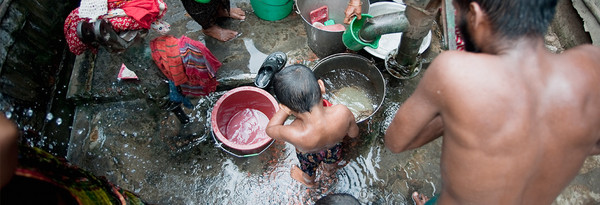Interview with Joachim von Braun, Director – Center for Development Research (ZEF), Germany
Joachim von Braun, is an economist, with a Doctoral degree in agricultural economics from University of Göttingen, Germany. He joined ZEF as Professor and Director of the Department for Economic and Technological Change in December 2009. He was also Director at ZEF during its foundation phase 1997-2002. Before returning to ZEF, von Braun was Director General of the International Food Policy Research Institute (IFPRI) based in Washington, DC, USA, from 2002 to 2009. His research addresses international development economics topics, including markets and trade, natural resources, poverty, health and nutrition, science and technology.
The problem of water scarcity is going to escalate worldwide in the foreseeable future due to population growth, urbanisation, and the growing water demands of agriculture, industry and households. This situation is calling for much faster institutional and technological innovations to achieve improved management of the resource water and the optimisation of its use.

Question:
Mr von Braun, what are the reasons for the little progress on integrated water resources management (IWRM) 20 years after Rio? Does the concept of IWRM need “re-evaluation and operationalization”?
Response:
I see substantial progress during the past 20 years in water management and in making water a more valued resource. We are most likely going to reach the drinking water-related MDG which has some relation to IWRM. But I do agree that we need re-evaluation and see IWRM in a broader context of the nexus among water, food, energy, and health.
Question:
Balancing human needs, economic efficiency and ecosystem protection is a big challenge. How could water use efficiency be improved to master this balance appropriately?
Response:
Efficiency is key to reduce the competitions among multiple water uses and related trade-offs . But human needs in relation to water also have a human rights dimension, that is access to minimum essential supplies of safe water and basic sanitation, so it is not only an efficiency issue. The utilisation of water for different purposes requires that multiple-use-systems are managed well. That is where efficiency has to come in. And we have to think more in terms of efficiency along whole water-value-chains in hydrological systems.
Question:
Is water pricing an option to improve water use efficiency? What could be an adequate mechanism to protect the poor?
Response:
Scarcity of a resource needs to be signalled to all users. So water pricing is a necessity, but implementation is a complex institutional challenge. The poor need to be protected by having access to safe drinking water, and farmers in irrigation schemes need access to some irrigation water. To address these concerns can be handled by a system of market segmentation, that means before pricing at marginal costs kicks in, basics needs are to be ensured.
Question:
Agriculture is the biggest water user with relatively low economic return. How to cope? Is food security endangered?
Response:
Irrigated agriculture, where it is practised, is the backbone for national food security in many countries. Additionally, climate change also puts pressure on freshwater resources and therefore on food security. The world is in a precarious food security situation for decades to come. It is well known that agriculture uses about 70% of the water withdrawn from nature. Water use efficiency especially in agriculture has to increase. Technical and institutional innovations are needed for that and both of these innovations depend on sound research. Otherwise we will not cope with the water shortages in main parts of the world. Actually there are few places of real water shortage. Often shortage is rather a result of wasting water because institutions are ill designed or access to technology is impaired.
Question:
You advocate that water rights should be decoupled from land ownership. How to proceed? What are the main research needs in this field?
Response:
First of all, separating water rights from land rights is necessary because the two resources – land and water – operate in completely different market situations. To put it simply: The use of water, underground, above-ground or rainwater requires institutional adaptation to the very nature of water being liquid. Land is fixed and local. To have fair and efficient water systems and land markets requires ownership and use- rights separation. Only then both markets can function efficiently and interact well. Countries like South Africa and Australia have already implemented such policies. Other countries should follow that track. Separating water from land permits creative and community based institutional arrangements of the allocation of the precious liquid. Institutions should focus on the actual conditions of the respective freshwater resources. There is great need for more research into these critical water and land nexus issues, and that should systematically explore relevant patterns and facilitate adaptation of innovations to local circumstances.
Question:
What type of engagement in water science do you envisage for ZEF? In which way is ZEF planning to put further emphasis on water research in the future?
Response:
Water was and is a central priority at ZEF. We may move further into research that emphasises trans-sectoral nexus aspects of water, that is, water and food, water and energy, water and health linkages. In each of these linkages, improvement on the side of water can be critical for peoples’ well being and economic benefits. We see frontiers of water related research in interdisciplinary work on the connections between so called “large” and “small” water especially for improving water quality, sustainability of water use in multi-use hydrological systems, the connection of water and public health and a continued strong emphasis on water in the context of land use systems. Adaptation to climate change has to have a main emphasis on water. That is why ZEFs research on climate change puts water very much at the centre of attention.
We thank Joachim von Braun for this interview.